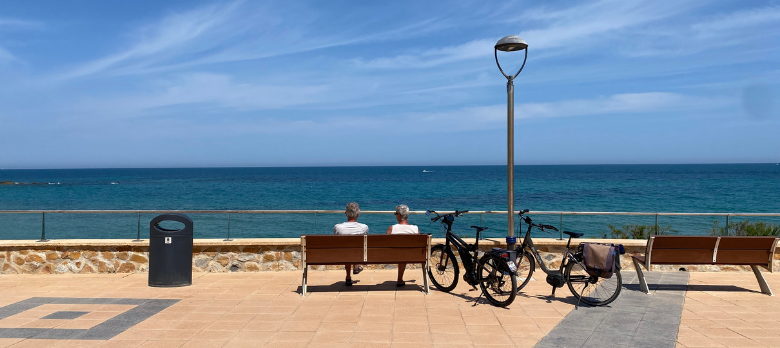Spain is the world’s favorite vacation spot for many English-speaking tourists. Also, this country has long been chosen by the Brits who wish to run away from fogs and rains. And therefore, they are very interested in the question: how widely spoken is English in Spain?
Let’s face it: English is not the most spoken language throughout Spain. Research suggests that about 27% of the current population of this country are able to express themselves in English, but few can do it fluently and correctly.
Distressing statistics also say that roughly 60% of Spaniards are completely unable to speak, read or write in English at all. But things are changing when it comes to resort towns or big cities like Madrid and Barcelona.
In almost all tourist areas, English-language services can be easily found: hotels, shops, restaurants, bars are nearly always have English-speaking personnel. Tourist destinations where you will surely find English include:
- Madrid
- Barcelona
- Valencia
- Malaga
- Beach resorts beloved by Brits like Costa Del Sol, Poble Nou de Benitatxell, Marbella, etc.
- Incendiary insular resorts – Ibiza, Majorca and Tenerife cannot also complain about the lack of demand from the Brits.
Seville is the birthplace of flamenco and the city of beautiful ancient architecture that is also very popular among British tourists. But, the real problem is that despite the abundance of tourist sites, the level of English proficiency among locals is quite low. However, this is more than compensated by the goodwill and openness of the Spaniards, who are always ready to explain themselves using hand-gestures: they will certainly try to help the foreigner in the event of any difficulties.
Tourist Opinions
Please find below, on the Tripadvisor portal, what tourists think about the prevalence of English in Spain:
… Expect (in Spain) the same level of English that you would find in France or Italy. Be aware that teenagers and young people (below 30 or so) are more likely to speak English because they had it at school (before that French was the foreign language of preference)
I would like to add that general approach of Spanish people is to be welcoming to foreigners, so even in the case they cannot understand you they’ll try to help.
And one more opinion:
The main tourist sites have people who speak English. All the hotels will have people who speak English.
Most young people have studied English but do not practice it. So if you need directions, look for a young person for help. The reason they cannot practice English is that all movies for the screen and for TV are automatically translated to Spanish.
That said, as with most of the major European countries, if you are dealing with people who are dealing with tourists, then you should be fine in most parts of Spain.
In fact, the knowledge of the basic phrases in Spanish like greeting, acquaintance, simple requests will greatly facilitate your communication with Spaniards and put them in the mood even if your speech will be in fact something Spanish-English.
English in Some Major Spanish Resorts

Here is a brief description how things are with English in some of the major Spanish tourist destinations:
Madrid offers a pretty good level of English in its central districts, but not so good as some other more touristy places of Spain. Of course, you will not have any problems with services in English at hotels, restaurants and rental points. But, as for sleeping blocks and elderly persons, the level of English is significantly lower. Madrid is not the most tourist oriented city in Spain: so some basic Spanish phrases and expressions will help you, but better bring your phrasebook.
Barcelona is a very modern and developed city, which attracts many people to live and work here. Usually, local youth can boast of a fairly decent level of English proficiency. Every year Barcelona hosts not only tourists from all over the world, but also students and expats. English-speaking staff is available in almost all restaurants and hotels, especially located in tourist places. Not all taxi drivers and elderly persons can be fluent in English, but as for excursions in museums and tours of the city – they are most often conducted in English. So there is no need for speaking Spanish, but why not please the locals with at least a few words in their language?
Valencia is a big and lively city, whose economy does not choose tourism as a main priority, but still English is often spoken around here. First of all this relates the stuff that works in the tourism sector, but do not expect that the general level of language proficiency will be impeccable. Street signs of Valencia are usually written in Spanish (Castellano) and/or in the local language (Valenciano), so it will not prevent to get a guidebook in English in advance (in addition to the phrasebook).
Malaga is always so welcoming to tourists – its guests, therefore, spoken English is widespread everywhere here. Barmen and waiters will easily take your order in English, and the menu in the restaurant will probably be in English too. Also, real estate agencies, car rental offices and souvenir shops like to please their clients with the multilingual service. However, a couple of phrases in Spanish will be appropriate in any case.
Seville is a really hot city (in every sense) that located in the south of Spain. However, there are fewer English-language services here than we would like. In recent years, the situation has been changing rapidly, because it is English that children learn as a foreign language. Elderly Spaniards were taught French at school that makes it much more difficult for them to communicate with you in English. In the nearby cities of Granada, Cadiz or Jerez, the situation is similar.
Costa del Sol brings together tourist resorts like Benalmadena, Fuengirola, Marbella, Mijas and Torremolinos. This beautiful coastal area attracts not only tourists, but also many English-speaking foreigners who often stay here to live on a permanent basis. We are talking not only about retirees but also expats and rentiers. Many residents of these resorts enjoy a variety of services in English every day, especially in bars, cafes and restaurants. The presence of numerous British communities promises comfortable living here even without knowing Spanish.
English for Long-term Stay or Permanent Residence in Spain
To enjoy Spanish sun during holidays is a great idea that does not require in-depth knowledge of foreign languages, but what if you want to live here for a long time? What issues should be taken into account if you are a native English speaker who moves to Spain:
- Whether you should study Spanish residing in Spain – it as a whole is dependent on how much you wish to immerse yourself into Spanish life style and culture. Do you wish to deal with any work at a Spanish company, study at a local university or make new Spanish-speaking friends etc. For all these purposes, you should have a pretty high level of Spanish.
- If you’re serious about conquering of Spanish, don’t worry – its phonetics and syntax will pleasantly surprise you with their simplicity in contrast to English or e.g. French.
- Spanish verbs behave less friendly but they can be got a handle with due diligence.
- Do you have difficulties with foreign languages? You can settle in expat communities, like Almeria, Alicante, Benahavís, Benijofar, Marbella, San Fulgencio etc. There is no need to study Spanish: Radio and TV programs, as well as restaurants and supermarkets are always available to English-speaking public of these areas. You can use only English here – no problem!
- And yet, without dependence on where you reside in Spain, it would be nice to make some endeavor to learn the local language as well as customs – just for everyday greetings and formalities. Your new neighbors will always appreciate these efforts.
- In general, studying Spanish if you have chosen Spain for long-term residence is highly recommended – it is within reach for those who have the greatest motivation to do it.
2022: Spanish Provinces Where English is Widely Spoken Thanks to Residing of Brits
- Alicante with a total of 74,279 Britons (26.33%)
- Malaga with a total of 53,500 Britons (18.96%)
- Balearic Islands with a total of 17,953 Britons (6.36%)
- Almeria with a total of 17,201 Britons (6.1%)
- Barcelona with a total of 16,964 Britons (6.01%)
- Murcia with a total of 16,625 Britons (5.89%)
- Santa Cruz de Tenerife with a total of 14,557 Britons (5.16%)
- Las Palmas with a total of 14,166 Britons (5.02%)
- Madrid with a total of 11,605 Britons (4.11%)
- Valencia with a total of 9,335 Britons (3.31%).



